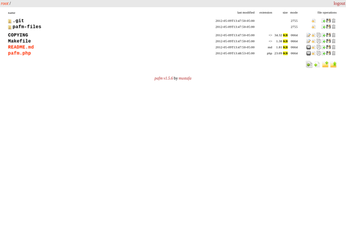PAFM: No-Frills Web-Based File Manager

Productivity Sauce
PHP Ajax File Manager (PAFM) is decidedly bare-bones, but this simple application can come in handy when you need to set up a web-based file manager on your server in a pinch. Indeed, deploying PAFM requires only a few simple steps and can be done in a matter of minutes. Grab the latest version of PAFM from the project's GitHub repository, and unpack the downloaded archive. Open the pafm.php file in a text editor and edit the following two lines:
define('PASSWORD', 'auth');
define('ROOT', '.');In the first line, replace auth with the password you want, and in the second line specify the path to the directory PAFM should use as its root. Upload the entire pafm to your server, and you are done. Point your browser to http://127.0.0.1/pafm (replace 127.0.0.1 with the actual IP address or domain name of your server), and log in using the specified password to access PAFM.
PAFM's interface won't win any prizes for its looks, but it does the job pretty well. Using the available buttons, you can quickly upload multiple files as well as create files and directories. Next to each file and directory, there are shortcut buttons that let you copy, rename, move, and delete a specific file or directory. PAFM also features a built-in text editor where you can modify text-based files directly on the server. Better yet, using the CodeMirror button, you can easily install the CodeMirror editor designed specifically for working with popular languages like PHP, JavaScript, Python, etc.
comments powered by DisqusSubscribe to our Linux Newsletters
Find Linux and Open Source Jobs
Subscribe to our ADMIN Newsletters
Support Our Work
Linux Magazine content is made possible with support from readers like you. Please consider contributing when you’ve found an article to be beneficial.

News
-
Photoshop on Linux?
A developer has patched Wine so that it'll run specific versions of Photoshop that depend on Adobe Creative Cloud.
-
Linux Mint 22.3 Now Available with New Tools
Linux Mint 22.3 has been released with a pair of new tools for system admins and some pretty cool new features.
-
New Linux Malware Targets Cloud-Based Linux Installations
VoidLink, a new Linux malware, should be of real concern because of its stealth and customization.
-
Say Goodbye to Middle-Mouse Paste
Both Gnome and Firefox have proposed getting rid of a long-time favorite Linux feature.
-
Manjaro 26.0 Primary Desktop Environments Default to Wayland
If you want to stick with X.Org, you'll be limited to the desktop environments you can choose.
-
Mozilla Plans to AI-ify Firefox
With a new CEO in control, Mozilla is doubling down on a strategy of trust, all the while leaning into AI.
-
Gnome Says No to AI-Generated Extensions
If you're a developer wanting to create a new Gnome extension, you'd best set aside that AI code generator, because the extension team will have none of that.
-
Parrot OS Switches to KDE Plasma Desktop
Yet another distro is making the move to the KDE Plasma desktop.
-
TUXEDO Announces Gemini 17
TUXEDO Computers has released the fourth generation of its Gemini laptop with plenty of updates.
-
Two New Distros Adopt Enlightenment
MX Moksha and AV Linux 25 join ranks with Bodhi Linux and embrace the Enlightenment desktop.

